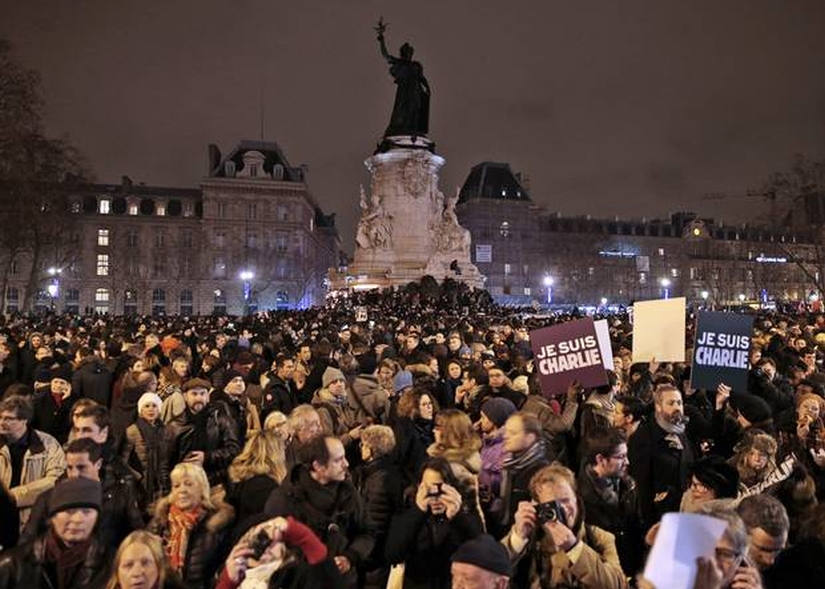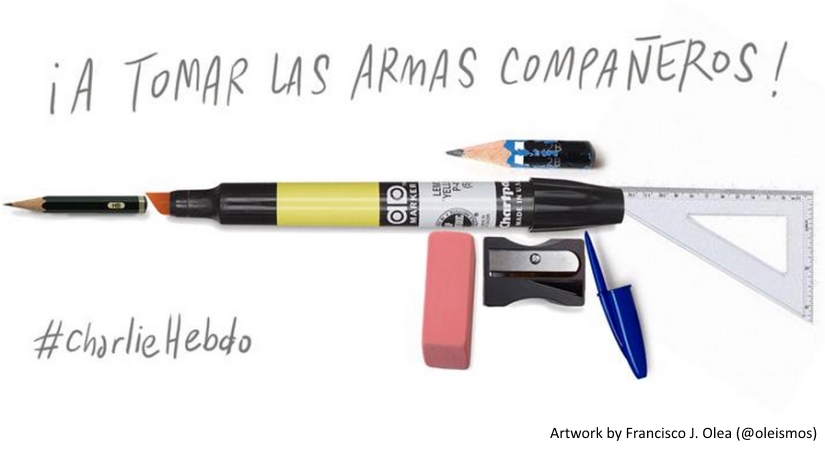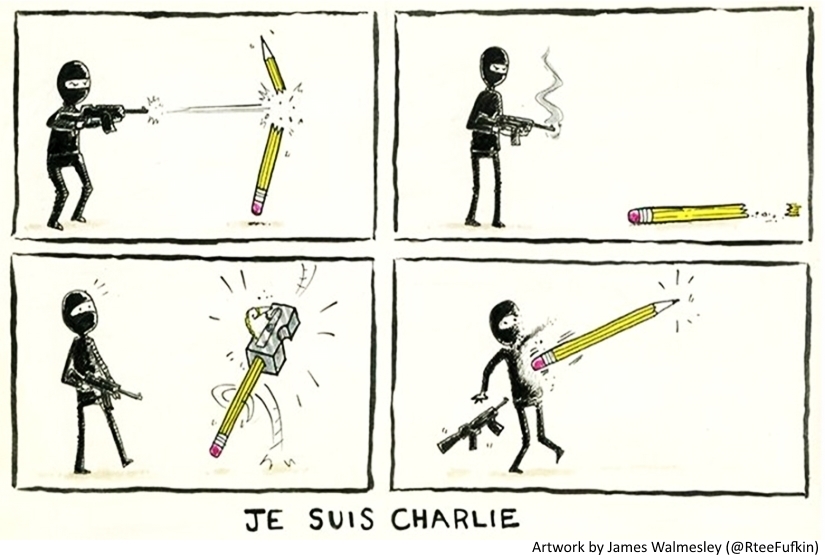Yesterday, France experienced its worst terrorist attack in more than five decades. At least two gunmen, brothers Said and Cherif Kouachi, entered the Paris headquarters of the weekly magazine Charlie Hebdo armed with assault rifles. The terrorists killed 12 people, including Charlie Hebdo editor and lead cartoonist Stéphane “Charb” Charbonnier, several other members of the staff, and two police officers. As of this writing, both of the Kouachis remain at large, though a third suspect, Hamyd Mourad, reportedly turned himself in to French authorities last night.
The attack was prompted by Charlie Hebdo‘s anarchic satire—a particularly cheeky “nothing’s sacred” approach the French call “gouaille”—which mocked the Prophet Muhammad as well as pretty much everyone else. Weeks after the September 11 attacks, the cover of Charlie Hebdo featured Osama bin Laden saying, “No hands,” as in a kid on a bike shouting, “Look, Mom: No hands!” Another cover featured Pope Benedict XVI sneakily instructing a pedophile bishop to get into the movie business to keep safe just like Roman Polanski. This brand of satire led to a 2011 firebombing of the Charlie Hebdo offices. As Arthur Goldhammer wrote yesterday in Al Jazeera America, “The whole point of Charlie‘s satire was to be tasteless and obscene, to respect no proprieties, to make its point by being untameable and incorrigible and therefore unpublishable anywhere else.”
Yet symbolically, Charlie Hebdo has come to mean more than what it was. In a sign of solidarity, many in mourning across the world have taken up the slogan “Je Suis Charlie” (“I am Charlie“; this article’s headline “Nous Sommes Charlie” means “We Are Charlie“). Because of the audacity of the attack, the terrorists haven’t destroyed Charlie Hebdo. Instead they have given a financially shaky magazine with a weekly circulation of 50,000 all the eyes of the world.
Fundamentalism and extremism of various stripes tends to involve a lack of self-awareness and a lack of self-reflection, though mostly fundamentalists and extremists lack a sense of humor. Anyone who takes themselves or their ideology so seriously that they resort to murder or threat of violence after feeling offended is, frankly, an asshole.
I’m not saying that I’m an arbiter of what people should or should not be offended by—your right to be offended is wholly your own—but what I am saying is that there are better and more constructive ways to express your feelings than harming others or threatening to harm others, and if you harm others or threaten to harm others simply because you are offended, you are an asshole. This goes for the people who carried out these attacks, the hackers at Guardians of Peace trying to stop the release of The Interview, the belligerent Gamer Gaters who put commentators and developers in their crosshairs, the person or people who bombed the NAACP office in Colorado Springs, the man who murdered Theo van Gogh, and so on. It takes a special kind of ignorance and cowardice to justify one’s violent intentions using religion, country, or some other ideology.
The Charlie Hebdo gunmen reportedly screamed that Muhammad had been avenged after their act of murder, as if Muhammad had nothing better to do than read a French weekly magazine.
Assholes.
What these attacks and threats of violence ultimately do is set back the ideology that carried them out by creating a solid opposition against said ideology. It’s the sociopolitical version the Streisand effect, in an odd way. In rallies throughout Europe and in posts online, there are “Je Suis Charlie” signs and #charliehebdo. If Charlie Hebdo was mostly known in France before the attack, it is now an international symbol.
Jon Stewart opened last night’s The Daily Show expressing his condolences for the staff of Charlie Hebdo. “I know very few people go into comedy as an act of courage, mainly because it shouldn’t have to be that,” Stewart said. “It shouldn’t be an act of courage, it should be taken as established law. But those guys at Hebdo had it and they were killed for their cartoons.” (On The Daily Show‘s website, “Je Suis Charlie.”) The Onion also had a finely neutered and somber take on the tragedy with the headline “It Sadly Unclear Whether This Article Will Put Lives At Risk.” It’s worth reading in full. Hell, Louis CK even wore a makeshift Charlie Hebdo t-shirt when he performed at Madison Square Garden last night.
The chant at protests in which an especially horrific action has occurred is “The whole world is watching.” For a while, out of anger and out of sadness, the whole world is Charlie. George Packer in The New Yorker yesterday concluded his piece with line “We must all try to be Charlie, not just today but every day.”
To harm an artist is to fight a hydra.
[iframe id=”http://media.mtvnservices.com/embed/mgid:arc:video:thedailyshow.com:09f585e8-8f8f-4727-81d1-0eb972cc325d” align=”center” autoplay=”no” maxwidth=”825″]
Of course, one of the major fears is that the Charlie Hebdo shooting will foment an already ugly right-wing anti-Islamic sentiment that’s been building throughout Europe. The terrorists have not just set back their own cause, but they have made things worse for Muslims who are far from radical and simply want to live normal, peaceful lives. On American TV, Bill Maher didn’t help matters. Maher claimed on Jimmy Kimmel Live that hundreds of millions of Muslims supported an attack like the one on Charlie Hebdo.
While Maher’s “hundreds of millions” claim is probably way off—it’s supremely facile to assume the actions of a handful of people speak for hundreds of millions of people—there’s at least some precedent behind the claim. Salman Rushdie made a particularly bold statement yesterday in condemnation of the Charlie Hebdo shooting, and he knows firsthand about the horrors of religious extremism. In 1989, the Ayatollah Khomeini issued a fatwa against Rushdie for writing The Satanic Verses. This led to threats of violence against Rushdie, the murder of the novel’s Japanese translator, and assassination attempts against other individuals around the world associated with the release or translation of the book.
Rushdie’s statement regarding Charlie Hebdo reads as follows:
Religion, a medieval form of unreason, when combined with modern weaponry becomes a real threat to our freedoms. This religious totalitarianism has caused a deadly mutation in the heart of Islam and we see the tragic consequences in Paris today. I stand with Charlie Hebdo, as we all must, to defend the art of satire, which has always been a force for liberty and against tyranny, dishonesty and stupidity. ‘Respect for religion’ has become a code phrase meaning ‘fear of religion.’ Religions, like all other ideas, deserve criticism, satire, and, yes, our fearless disrespect.
Some of the best responses to the murder of Charb and his fellow cartoonists at Charlie Hebdo have come from artists around the world. Time, The Daily Beast, Reuters, Comics Alliance, and numerous other outlets have run galleries of art in tribute to those who died. Though many are touching, most have a kind of anarchic revenge about them, with an emphasis on art as way of overcoming ideological repression. James Walmesley tweeted one of my favorite cartoons about Charlie Hebdo, and Francisco J. Olea tweeted out his call to arms to the artists of all nations. In the face of this act of terrorist negation, here is an overwhelming counterattack of creativity. Don’t expect it to end.
Charb and his fellow writers and cartoonists have become heroes. Numerous new outlets have cited a 2012 interview with Charb at Le Monde with a line that speaks to the courage of a good satirist: “I am not afraid of retaliation. I have no kids, no wife, no car, no mortgage. It surely is a bit dramatic, but I’d rather die on my feet than live on my knees.”
As for Charlie Hebdo, the next issue will come out on Wednesday with 1 million copies in print. Further, Charlie Hebdo will continue to be published. Patrick Pelloux, a contributor to the magazine, said in an interview with iTele, “Charlie Hebdo will continue because [the terrorists] haven’t won. [The victims] didn’t die for nothing. There is no hatred to have against Muslims and everyone, each one of us, in front his home, every day must keep the values of the French Republic alive.”
Take that, assholes.
These large outpourings of compassion and creativity remind me of George Saunders’ Manifesto: A Press Release from People Reluctant To Kill for an Abstraction (PRKA), a short satirical (though ultimately sincere) essay I read whenever the world seems senseless and humanity doomed. It’s a fictional press release from an organization comprised of regular people trying to live without harming others and who want to find some modicum of joy and dignity in an existence that seems hellbent against such simple things.
Saunders’ piece closes with these words:
To those who would oppose us, I would simply say: We are many. We are worldwide. We, in fact, outnumber you. Though you are louder, though you create a momentary ripple on the water of life, we will endure, and prevail.
Join us.
Resistance is futile.
The flesh may be vulnerable, but people united not quite so, and the pen is mightier still.




